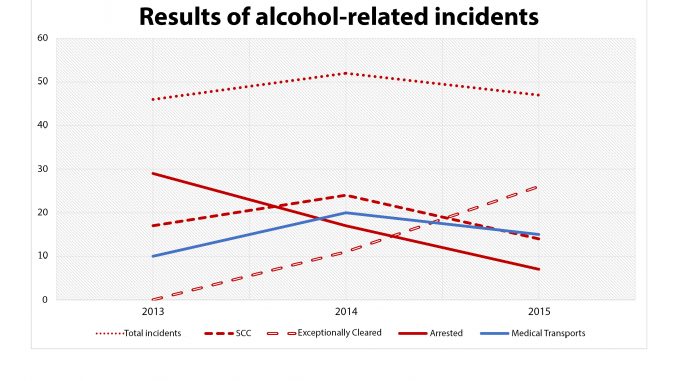
Despite increased student activity toward the start of this fall semester, arrests in the number of alcohol-related incidents have decreased in the past two years, according to data from Temple Police.
Executive Director of Campus Safety Services Charlie Leone said people are taken into custody when they don’t cooperate with police.
“[Arrests] usually happen when people make it more difficult,” Leone said. “When they yell or start to resist is when they get cited.”
However, this past month has shown a 75 percent decrease in alcohol-related arrests since this time in 2013, while the number of incidents has remained level.
“A large part of the citations happen in residence halls,” Leone said. “The students are too intoxicated when they come back, so security will call us.”
Alicia Dowling, a security officer in the Johnson and Hardwick residence halls, said she has not yet had to call Temple Police for a student.
“I’ve smelled it,” Dowling said. “But nobody has been drunk enough for me to call.”
When at the security desk, Dowling and other security officers look for slurred speech, stumbling and an inability to walk or hold composure when deciding to call Temple Police.
“We have to call when a student is like, lying on the floor and not with life,” said Tyler DeVice, a sophomore communication studies major and resident assistant at Johnson and Hardwick. “If they’re okay enough to get to their room, I don’t see any need to interfere.”
The past couple of weekends have resulted in increased bag checks from residence hall security because of increased incidents in various residence halls.
“I do them daily,” said Dowling, who works all five weekdays. “They’re random, and I’ve had people walk away. But I’ve heard it gets crazy over weekends.”
Dowling explained intoxicated students are not allowed to go to their rooms and are instead asked to “sit down until Temple Police show up.”
Students can call Temple Police on their own and request medical amnesty to avoid university discipline.
Leone said students who receive medical amnesty are usually referred to the Student Code of Conduct to simply follow procedure.
“After they get out of the hospital we send them to Student Affairs, and then we track it to keep tabs on them,” Leone said, adding there is a very low rate of students returning for the same infraction.
The past three years have shown a 33 percent increase in alcohol-related medical transports, with a total of 15 for the month of August.
Along with residence halls, Temple Police often find people on the street who are intoxicated enough to be considered unsafe. About 40 percent of the people stopped and cited for alcohol-related incidents are not Temple students, Leone said.
“They’re friends of students that are here to visit and party,” he said.
Leone added Temple Police respond to incidents when students compromise the safety of everyone in the building.
“It’s scary when we see people partying on rooftops,” Leone said. “The structures actually start to pull away from the building. That’s when we go in and break up parties—when it starts to be unsafe.”
Leone said the goal of Temple Police is not to punish, but to make sure that students remain safe.
“Our primary goal is safety,” said Leone. “Unfortunately we sometimes end up on the enforcement end of a situation.”
Editor’s Note: Tyler DeVice was a sportswriter for The Temple News last year. He did not contribute to any part of the editing process for this article.
Julie Christie can be reached at julie.christie@temple.edu or on Twitter @ChristieJules.


Be the first to comment